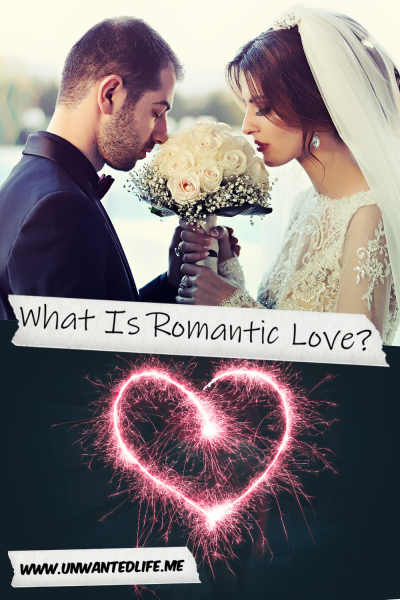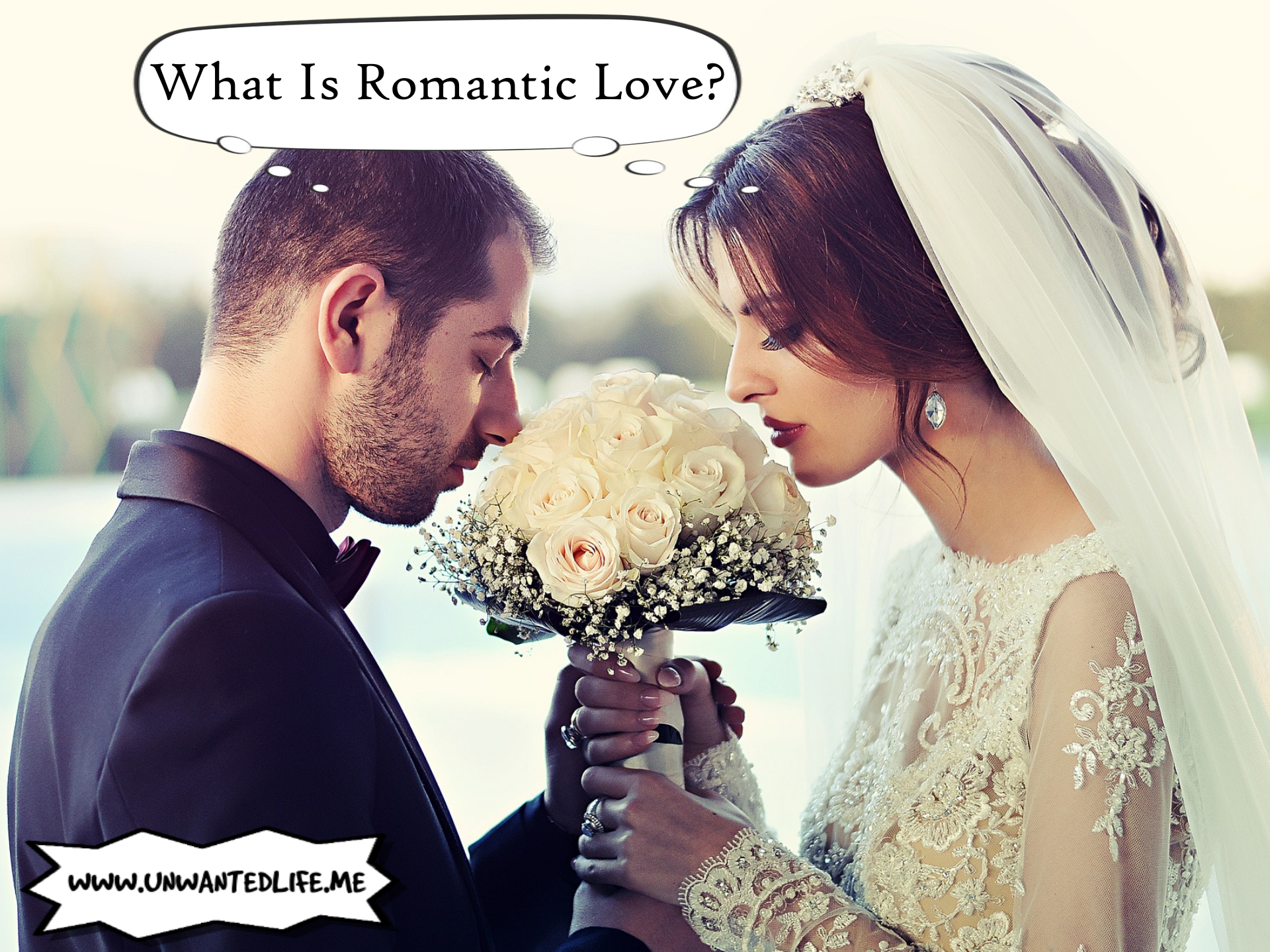With Valentine’s Day coming up, I thought I’d look at what romantic love is. I ask myself what love is a lot and often ask people to describe what they think love is and how it feels for them. I do this because I’m unsure if I’ve ever seen love or felt love, or at least not in the way love is portrayed in the media of films, TV shows, novels, etc., which isn’t realistic.
Because of my mental health problems, specifically my borderline personality disorder, I’ve always had problems with my emotions and with attachment. I fall into lust hard, which will last about two to two-and-a-half months, and then it’s completely gone. No matter the person, no matter how much they seem to really want me. Once it hits that threshold, my lust turns to being repulsed by them, and it’ll get worse and worse until I end the relationship. When the relationship is ended, then that repulsion goes.
I have no control over this, just like no one has control over who they fall for or who they fancy. I am fully aware of the biological process of attraction and what we call love, so it begs the question, what is love? And with that, is love real?
Because my feelings of lust go from one extreme to another, once the threshold has been reached, I really want to know how everyone else is able to love someone past that point. Surely everyone loses that initial lust and when they do, then what?
The Biology Of Love
There’s no denying that biology plays a role in love. Everything we are is controlled by how our brain systems work, and the chemicals our bodies release. This is why I doubt that the romantic love we idealise really exists as something special, and rather, it’s just an uncontrollable biological process that enslaves our conscious minds.
This causes our conscious minds to create this ideal love image to create some kind of illusion of control over who we fall in love with and fall out of love with. Who among us can say they’ve not fallen out of love with people that we’re ideally suited to them for reasons that don’t really exist?
Although we like to think we have a choice in who we want to be our partners, in reality, it’s a coordinated effort of several brain systems that causes mate selection.
I know I’ve found myself drawn to people I was never romantically interested in, and then after the short relationship ended, asking myself, “Why I was briefly into them?” Returning to being romantically uninterested in them again, because although they’re good people, there was never anything about them that made me want a relationship with them, but for a brief period, there was, for no logical reason, I can explain.

That’s because love isn’t a choice, at least not one our conscious minds make, anyway. This is a view also shared by Fisher, Aron, and Brown (2006), who state that love is involuntary, hard to control, and impermanent.
This is further supported by Fisher, Aron, Mashek, Strong, Li, and Brown (2002), who claim that, in humans, the motivation-emotion system has evolved into a brain network that we call romantic love. Which I would agree with. We are, after all, still a mammal. Plus, like all life, we’re meant to help perpetuate our species. So it would make sense to have an evolved biological system to make this happen.
What we call love is an evolved system to continue our species through reproduction. It’s a system that evolved in all mammals and avian species for the sole purpose of procreation and the successful upbringing of our young.
According to Fisher, Aron, and Brown (2006), the three drives of our motivation-emotion system, behind what we call love, are:
- The sex drive (lust). Which evolved to motivate us to seek a range of mating partners.
- Attraction. This evolved to motivate us to prefer and pursue specific partners. I.e. our preferences.
- Attachment. That evolved to motivate us to remain together long enough to complete species-specific parenting duties. However, this one seems to be lacking in me, either causing or as a result of my borderline personality disorder.
These three behavioural drives are manipulated by our bodies’ release of hormones and monoamines. Our bodies seem to do this because this system we call love allows us to focus our romantic energy on specific people. This allows us to conserve valuable time and energy (and money) when trying to find a mate/partner.
The hormones and monoamines that are meant to be at play regarding our three motivation-emotion system drivers are: testosterone, oestrogen, dopamine, oxytocin (also known as the love chemical), and vasopressin.
To hammer the point home that what we call romantic love isn’t that different from our fellow mammals, as a lot of our traits are the same. According to Fisher, Aron, Mashek, Strong, Li, and Brown (2002), our increased energy, focused attention, our desire to want to be around them, affiliative gestures, possessive mate guarding, goal-oriented behaviours, and our motivation to win our preferred mate/partner.
I know that there are two things in my life that motivate me. When someone new makes their attraction to me known, I also like them; and anger. All other times it’s a never-ending battle to do even the basic things in my life, due to my sheer lack of motivation.
Unconditional Love
Unconditional love often gets thrown around like it’s a real thing, but is it? There are many parents that don’t love their children, for one reason or another. Plus, should you give unconditional love to those who don’t deserve it, for example, in the case of abuse?
Even animals will eat their young to save themselves in order to escape. Allowing them the chance to try procreating again. They eat their young in order to get the energy needed to escape, if trapped, with only one way to escape, running for it.
I don’t believe in unconditional love due to my attachment issues, which are either the cause or the result of my borderline personality disorder. I often wonder if I love my mum or not, which is another reason why I ask about how love is for other people, in order to try to work out if I do or not.
This also makes me concerned about whether I’ll be able to love my children, should I have them, due to my issue with love and attachment.
Surely, doesn’t all love have conditions, to an extent? Otherwise, you risk being taken advantage of in one form or another. This might not always be domestic abuse, but also being taken for granted and cheated on.
The Concept Of Love
Is what we think of as love merely a human-created concept to give meaning to our bodies’ method of choosing our mates/partners?
Can we say that the romantic love we’re all hoping for is real if it’s nothing more than the combination of the three drives of our motivation-emotion system, which encompasses several brain regions?
I guess the real question for me is, “Is my biological process for love malfunctioning, which is causing my borderline personality disorder, or is my borderline personality disorder causing my biological processes for love to malfunction?” What are your thoughts?
Furthermore, isn’t it better to choose who you want to be in a relationship with, rather than being with the person your body chemistry is telling you to be with? Because that way you’re with someone you want to be with by conscious choice, rather than just the near randomness of your body’s drives.
Lastly, sometimes love isn’t always enough. The timing can be wrong, or the feelings of love just don’t match up with the reality of the person you love or are in a relationship with. Thus, the concept of love and that love can be unconditional would also appear to be part of the media’s myth of what love is, not what it actually is.
As always, leave your feedback in the comments section below. Also, feel free to share your experiences and thoughts about love in the comments section below as well. If you want to stay up-to-date with my blog, then sign up for my newsletter below. Alternatively, get push notifications for new articles by clicking the red bell icon in the bottom right corner.
Lastly, if you’d like to support my blog, then you can make a donation of any size below as well. Until next time, Unwanted Life readers.
References
Fisher, H., Aron, A., Mashek, D., Strong, G., Li, H., & Brown, L.L. (2002). The Neural Mechanisms of Mate Choice: A Hypothesis. Neuroendocrinology Letters, Suppl. 4(23), 92–97. PMID: 12496739 Retrieved from https://www.nel.edu/userfiles/articlesnew/NEL231002R09.pdf.
Fisher, H. E., Aron, A., & Brown, L. L. (2006). Romantic love: a mammalian brain system for mate choice. Philosophical transactions of the Royal Society of London. Series B, Biological Sciences, 361(1476), 2173–2186. Retrieved from doi:10.1098/rstb.2006.1938 and https://www.ncbi.nlm.nih.gov/pmc/articles/PMC1764845.


This is such an interesting read for such a universal, intricate topic! I love how much research you put into writing this! Keep up the great work! x
Thank you. I’m glad you found it interesting
I have really always wondered this actually. I have attachment issues and a lot of mental health struggles and have also wondered if unconditional love exists. This post really has me thinking. Thank you
I think it’s my issues with attachment that gives me a more analytical view of how things work, because I want to understand how it all works. But unlike my other issues, which I can find way to modify them to see improvements, being able to love doesn’t seem to be something I can fix in myself
What’s your blog address, by the way?
Good post! So informative and academic. I solute you for the effort.
Thank you ?
One of the ideas I’ve been toying with (in my mind, at least) is: could I love myself enough that I don’t look for another person to complete me, but rather choose to love from a place of accepting them as they are?
I think unconditional love only flows from loving ourselves unconditionally – and I haven’t yet reached that point. At least not consistently!
As long as the love for yourself doesn’t become like Trump’s love for himself, aas the only person he loves is himself, then anything is possible I guess
Very interesting to hear your struggles with BPD and how that affects you. I really enjoyed how informative this post was x
Thanks. I’m glad you enjoyed it
Wow this is an amazing post!
Thanks
That is a great thought; sometimes love is no enough.
I love love, and perhaps I do have an attachment to it, even though I do not know it well enough to say for sure. What I do know is that love does not excuse things or make things right, and, even when you love a person heart, body, and soul, you may still do things you regret.
Neatly written post on this topic!
Thank you
Wow I’m actually kind of the opposite to you because I almost never feel lust, and only feel it for someone when I love them. Love is definitely involuntary though because I’ve fallen for some real pieces of shit!
Ash | https://thisdreamsalive.com
Sorry to hear that you’ve ended up loving some undesirable people